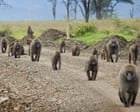If male baboons were subject to the same kind of cultural commentary as humans, the phrase “deadbeat dads” might be called for, such is the primate’s relatively limited involvement in raising their young.
But a study suggests that even their little effort might go a long way, with female baboons who experience a stronger relationship with their fathers when young tending to live longer as adults.
“Among primates, humans are really unusual in how much dads contribute to raising offspring,” said Prof Elizabeth Archie, co-author of the research from the University of Notre Dame in Indiana.
“Most primates’ dads really don’t contribute very much, but what the baboons are showing us is that maybe we’ve been under-appreciating dads in some species of primates.”
In the journalProceedings of the Royal Society B, Archie and colleagues reported how they studied wild baboons in Kenya, focusing on 216 females fathered by 102 males, as confirmed by genetic data.
The team studied the frequency of grooming interactions between fathers and daughters during the first four years of the females’ lives, as well as recording the total number of days fathers and daughters lived in the same group over that period. They then tracked how long the daughters lived as adults.
Archie said the team focused on female offspring because males often moved to other social groups as adults, making it difficult to track how long they live.
The researchers found that female baboons who, during the first four years of their life, lived in the same group as their fathers for longer and spent more time grooming with them, lived two to four years longer as adults than those who experienced weaker relationships with their dads. If only one of the two occurred, an increase of about two to three years was found, Archie added.
“A typical lifespan for a female baboon, if she reaches adulthood, [is] 18 years,” she said, noting that females tended to have offspring every 18 months or so. “So living two to three years longer would allow her time potentially to have another kid.”
That, Archie added, might provide an incentive for fathers, given males were less able to fight others for mates as they get older.
“They can no longer compete for females, but what they can do is help their daughters,” said Archie. “And if their daughters live a little bit longer, then the fathers will pass on more genes and have higher fitness because their daughters are living longer and having more kids.”
The researchers found that strong relationships between young females and adult males in general, or with males who were not their fathers, was not associated with an increase in females’ survival as adults.
Sign up toDown to Earth
The planet's most important stories. Get all the week's environment news - the good, the bad and the essential
after newsletter promotion
Archie said it was not yet clear why the strength of early-life relationships between daughters and fathers might affect females’ survival as adults, but said a number of mechanisms could be at play.
Among them, she suggested fathers were more likely to step in should their daughters get into fights, or by sheer intimidation create a “zone of safety” around them so they were less likely to have food stolen or be injured or harassed – helping them grow into healthier adults.
But, Archie noted, there was another possibility.
“Maybe it is just that healthy daughters have good relationships with their fathers, and they also live longer,” she said.
